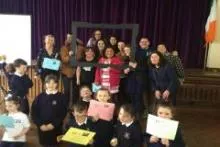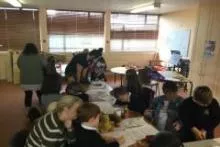Project
A short annual six-week Irish language support intervention co-designed by parents, Home-School Community Liaison Co-ordinator, tutor from Limerick Clare Education and Training Board and academic and support staff at Aonad na Gaeilge (The Irish Language Centre), University of Limerick. The 2019 format involved a language support session for parents on their own for the first hour and this was followed by a joint session for parents and children together. The aim was to work on basic Irish language greetings and phrases and to introduce parents to a few rhymes each week with a view to them using these at home with the children.
We are offering Irish language learning and language support opportunities where the focus is on fun, being active, being part of a local group, and giving Irish a go rather than on being fluent or accurate. We are interested in looking at a new model of parents and children learning together in this DEIS Irish-medium school where parents and pupils are experiencing, or are at risk of experiencing educational disadvantage. We are keen to use arts-based methods as a way to explore new ways of designing language support interventions based on participants’ needs and suggestions.
Parents, grandparents, children and staff at the school and community partners. The main participants in 2019 were a group of parents and their children, school pupils from junior classes in the primary school, aged 5-9 years old; the Home School Community Liaison Coordinator (Veronica Moynihan); an Irish language tutor with the Limerick and Clare Education and Training Board (Pól Ó Flatharta) ; the administrator at Aonad na Gaeilge, University of Limerick (Ciara Considine) and Director of Aonad na Gaeilge, UL, trainee mentor on the Knowledge for Change (K4C) programme (Deirdre Ní Loingsigh)
The “Five Ways to Wellbeing” of Mental Health Ireland frame the discussion on outcomes and impact in the fieldwork report. These are Connect, Be Active, Take Notice, Keep Learning, and Give; simple “evidence-based actions” to improve wellbeing (New Economics Foundation, 2008). The Campus Engage impact indicators were also considered in the monitoring and evaluation of the project. The 2019 project took place during the International Year of Indigenous Languages and some of the criteria related to initiatives to celebrate this year were also useful in considering the impact of the language support intervention for Irish, a minority language. The evaluation of the previous projects will inform planning in 2022.
Research
Participants were encouraged to be open to growing their repertoire of linguistic skills and capacities and to value their competence in the Irish language. The research intention was to investigate what kind of intervention might be co-designed and piloted over a six-week period so as to create opportunities for change and nurture parental wellbeing . The K4C pedagogical principles were considered in the design of the CBPR project.
The 2019 project sought to frame a new Community-Based Participatory Research (CBPR) model of interaction between the University of Limerick and Community Partners involved in supporting Parents and grandparents at the Irish-Medium DEIS Primary School in Limerick.
A project report to the UNESCO sponsored Knowledge for Change (K4C) initiative (Cohort 3, 2019) as part of the requirements of the Mentor Training Programme (MTP). The interventions described are presented in the context of Sustainable Development Goal (SDG) 3: Good Health and Wellbeing, SDG 4: Quality Education, and SDG 11: Sustainable Communities. UNESCO attention, in 2019, to indigenous languages is also considered. Learnings about gaps, new capacities and competencies in interacting with community in the facilitation of CBPR are also highlighted..
Resources


